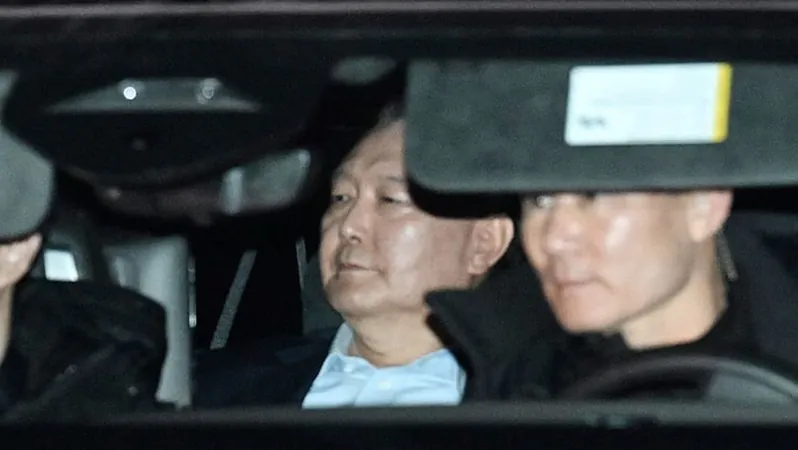
Political Turmoil in South Korea: President Yoon Suk Yeol Refuses Further Questioning Amid Arrest Drama
2025-01-16
Author: Yu
Political Crisis Unfolds
SEOUL: The political crisis in South Korea has reached alarming heights as President Yoon Suk Yeol, the first sitting president in the nation's history to be arrested, has announced he will not participate in further questioning set for Thursday, January 16. This decision comes in the wake of accusations of insurrection linked to his controversial martial law declaration from December 3, which was thwarted by parliament.
Dramatic Arrest and Aftermath
Yoon was taken into custody at the Seoul Detention Centre on Wednesday evening after a dramatic standoff at his private villa, where police arrived before dawn to effectuate the arrest. Reports indicate that he spent the night in a solitary cell, refusing to cooperate with investigators and leaving many of his supporters distraught.
Legal and Political Implications
As authorities scramble to question the suspended president within a mandated 48-hour window, Yoon's refusal to engage effectively stalls a significant criminal investigation into his actions during the martial law debacle. The political fallout has been severe, with Yoon now facing an impeachment trial in the Constitutional Court, which is set to determine whether he will lose his presidential powers permanently or be reinstated.
Martial Law Controversy
Yoon's controversial attempt to impose martial law was ignited by fears of North Korean aggression, claiming that drastic measures were necessary to protect the nation from what he labeled "anti-state elements." However, in just six hours, the move was voted down in parliament, leading to his immediate revocation of the order and subsequent impeachment proceedings.
Stalling Tactics?
Legal experts suggest that Yoon's team is employing a range of strategies to prolong the investigation, with some analysts predicting a potential delay in the impeachment ruling. Should the Constitutional Court side against him, Yoon could face the loss of his presidency, triggering new elections within a tight timeframe of 60 days.
Public Response and Protests
While Yoon's lawyer cites health problems as the reason for his client's absence from the questioning, critics are concerned that these tactics are merely stalling for time in a high-stakes political game. In a public cry for justice, protesters rallied outside the Corruption Investigation Office (CIO) office, denouncing the president's arrest as illegitimate and claiming that the investigation lacks legal standing.
Future of South Korean Politics
As tensions rise, many question the implications of these events on South Korea's political stability. With the nation facing one of its most tumultuous crises in decades, the world watches closely as Yoon's legal battles unfold and as the Constitutional Court approaches a potentially historic decision that could reshape the country's leadership.
Conclusion
Stay tuned for updates on this ongoing saga. The fate of President Yoon Suk Yeol hangs in the balance, and South Korea stands at a critical juncture!

 Brasil (PT)
Brasil (PT)
 Canada (EN)
Canada (EN)
 Chile (ES)
Chile (ES)
 Česko (CS)
Česko (CS)
 대한민국 (KO)
대한민국 (KO)
 España (ES)
España (ES)
 France (FR)
France (FR)
 Hong Kong (EN)
Hong Kong (EN)
 Italia (IT)
Italia (IT)
 日本 (JA)
日本 (JA)
 Magyarország (HU)
Magyarország (HU)
 Norge (NO)
Norge (NO)
 Polska (PL)
Polska (PL)
 Schweiz (DE)
Schweiz (DE)
 Singapore (EN)
Singapore (EN)
 Sverige (SV)
Sverige (SV)
 Suomi (FI)
Suomi (FI)
 Türkiye (TR)
Türkiye (TR)
 الإمارات العربية المتحدة (AR)
الإمارات العربية المتحدة (AR)